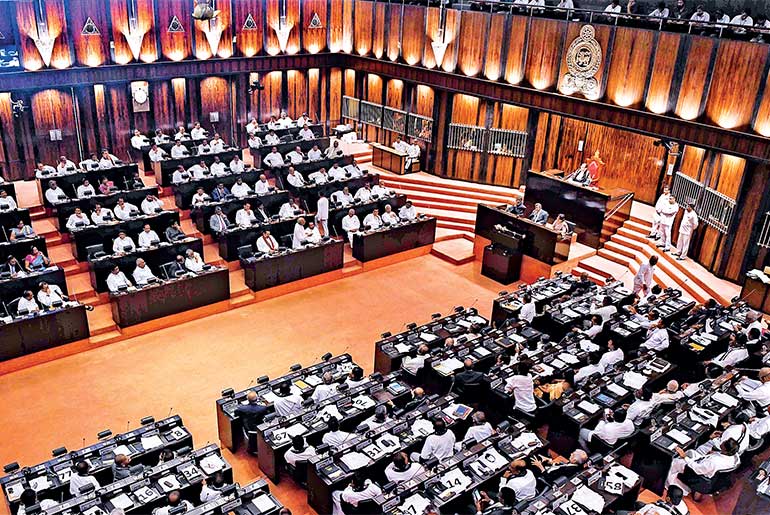Monday Feb 16, 2026
Monday Feb 16, 2026
Thursday, 15 December 2022 03:17 - - {{hitsCtrl.values.hits}}

The Sri Lankan constitution expressly and implicitly eliminates the basic objectives of government, such as ensuring the aspirations of the people and establishing a responsible governing system

Today, Sri Lanka’s governing system is bleeding, and its malfunctioning nervous system is being exposed in unprecedented fashion. The country has reached a constitutional impasse. The executive branch has devolved into a mere announcer of impending disasters. The legislative body has become a self-protective body of the legislators’ irresponsible, unaccountable roles. Prima face, the judicial actions relate to responsibility and accountability of government largely being curtailed, constitutionally and practically, to the interest of the former.
And what should be the top priority in rebuilding Sri Lanka remains an unspoken and enigmatic topic of the day. The article attempts to shed light on priorities and claim that moving towards constitutionally responsible and accountable government is the foundation that could enable the gate for all other reforms.
Over the last 70 years, politicians have continued to deceive people through manipulation, to exploit taxpayers’ money, to govern without responsibility or accountability, and to live a lavish lifestyle within the current constitutional governing system and political culture. They have been successful in preserving this exploitative culture and in maintaining an irresponsible, unaccountable governing system under the guise of democracy and a constitutional system.
Several express and implied articles in Sri Lanka’s constitution effectively elevated the government above the law. The President is above the law, executive actions are unjustifiable, and judicial review of legislative actions is prohibited by the constitution. Furthermore, the constitution elevates the judiciary above the law by denying the right to appeal in cases involving fundamental rights and allowing the court to deny leave to proceed without providing justification.
Further, the judiciary is positioned by the constitution of Sri Lanka as a subordinate entity of the parliament, undermining the separation of powers by curtailing the delicate balance between the three branches of the government and giving the executive and legislative bodies superior position over the judiciary. Furthermore, the constitution gives the executive branch the authority to appoint judicial officers to perform executive functions and compel them to work in situations where there is a clear conflict of interest. Furthermore, judicial officers, including lawyers, executives, and legislators, took an oath to defend these constitutional arrangements. And the judicial officer’s loyalty to protect the constitutional arrangements is the biggest guarantee for the Government to hold their unaccountable exploitation and misgovernance.
In a nutshell, the Sri Lankan constitution expressly and implicitly eliminates the basic objectives of government, such as ensuring the aspirations of the people and establishing a responsible governing system. Also, the constitution failed to embrace the basic means, to achieve the objective, such as rule of law, separation of powers, and accountability. Instead, the constitution of Sri Lanka literally and impliedly became the source of an irresponsible and unaccountable governing system.
Over a period of 70 years, the executives and legislatives began to believe that such enjoyment of irresponsible, unaccountable political office was their family heritage. When the top judicial office of the country interprets the constitution and state that the non-justifiability of executive action, even when it is contrary to other articles of the constitution is a settled constitutional interpretation tradition, it provides more assurance to the executive and legislative body to retain the exploitative and unaccountable governing system.
Likewise, political academia serves an irresponsible, unaccountable governing system. While the political science pundits claim that conducting free and fair elections, people electing the representative to office is the essence of democracy, and Sri Lanka embraced the democratic tradition in practise, while the undemocratic political parties and the politicians who hold the power view that the elections as a test of their ability to manipulate voters to retain their irresponsible and unaccountable power and their investment to retain exploitation and enjoyment of the power. Also, the so-called political pundits failed to address as to how electing an undemocratic body to perform functions without responsibility and accountability will sustain a democratic environment that meets the aspirations of the people.
Furthermore, politicians were able to enlist the support of subservient professionals, academics, and religious groups to serve them and the irresponsible, unaccountable governing system. Until now, these segments have served the politicians better in exchange for the unaccountable positions they have been given, and neither has felt the need to be accountable to the people, and there is obviously no obligation on their part to consider being accountable to the people under Sri Lanka’s constitutional and legal framework.
When the worst repercussions of an irresponsible, unaccountable governing system hit the people and hunger and hardship become a way of life as a result of bad governance, people react and begin to demand system change from the system itself. While allowing irresponsible and unaccountable governance to continue, people are also asking them to reset the system with responsibility and accountability to the people.
Such a demand is felt to be problematic not only by politicians, but also by personnel from all professions, including the legal professions that serve the system better. Unfortunately, they are all part of the irresponsible, unaccountable governing system, and they express that the call for responsible, accountable governance should be preceded by the blessing of the existing constitutional system, which blatantly prevents the Government from being responsible and accountable and has failed the people miserably.
Unlike ever in the past, today the extent of irresponsibility and unaccountability of executive, legislative and judicial bodies is being exposed by every minute through their actions and inactions. On the other hand, those who resist the irresponsible, unaccountable system lack clarity in their priorities and their demands, and they, too, stand with the same unaccountable system, with no hope of mitigating by preventing the imminent destruction or of rebuilding after the imminent destruction has occurred.
What is obviously missing on the path to rebuilding the system is primarily a lack of academic or intellectual ‘will’ to investigate and comprehend the need to prioritise the establishment of a constitutionally responsible and accountable governing system. If the lack of academic and intellectual will to address the priorities continues, it is highly likely that Sri Lanka will be the number one example of blanket failure among the world countries.
(The writer is a young academic specialising in constitution, law, and economy. His research focuses on the challenges of constitutional development in developing countries, building a framework for the people-centred constitution, the influence of populism over constitutionalism, and the devolution of power. Firdous has completed his Master of Law (LL.M) at the University of Colombo and an MSc in International Management from the University of Liverpool. His recent research contribution includes a critical analysis of the constitutional and policy framework on the Right to access to higher education in Sri Lanka. He can be reached via [email protected].)